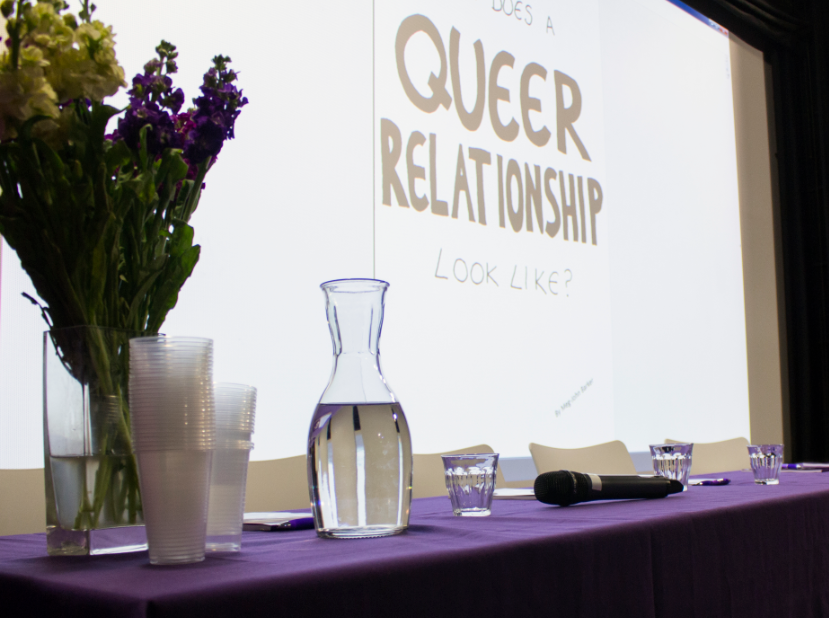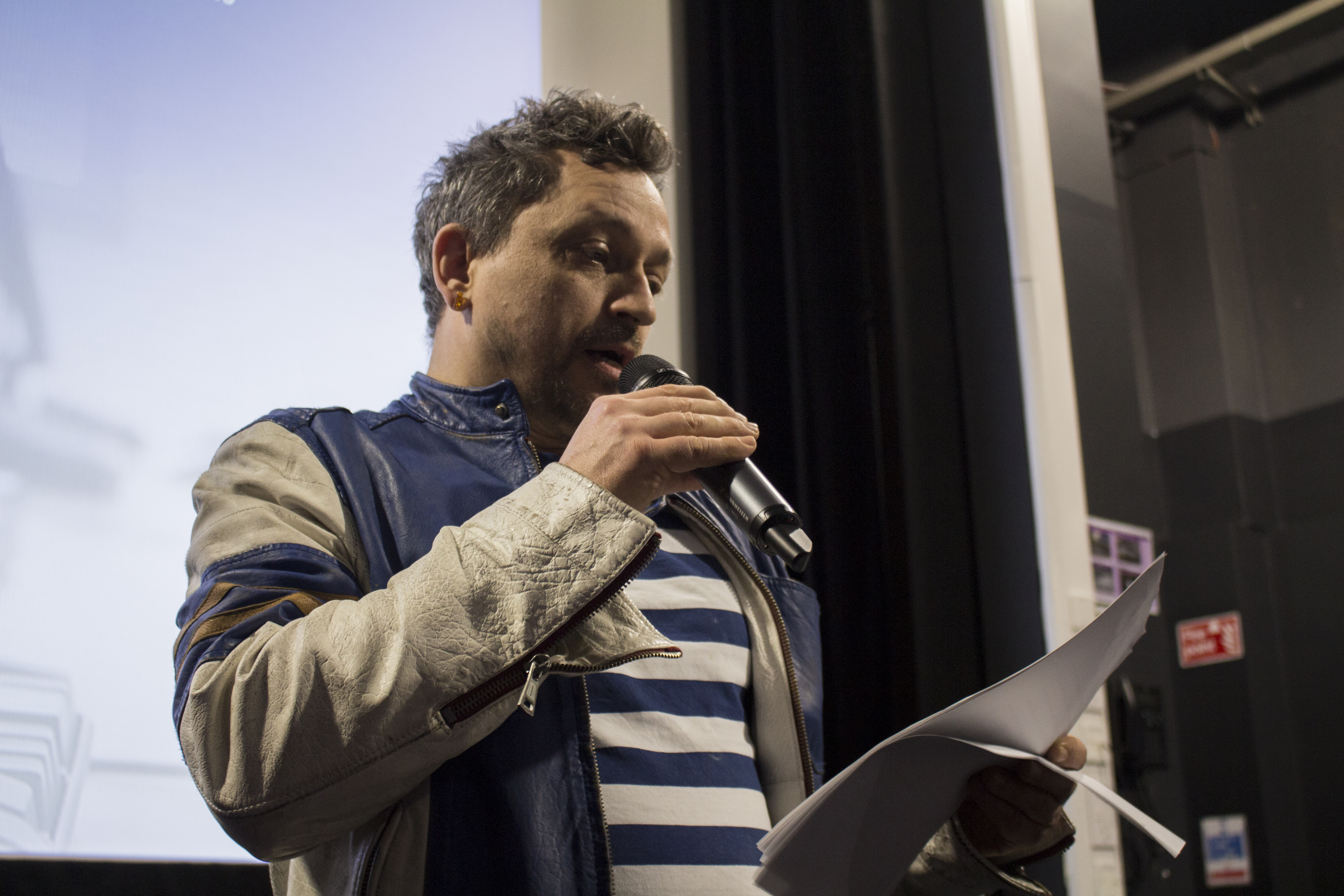
By Jamie Ryder
Photography by Laisla Rodrigues
Manchester Metropolitan University’s (Manchester Met) Humanities in Public series showcased the Polyamory, Consensual Non-Monogamy and Relationship Anarchy event on Sunday. The event took place at the university’s Number 70 building and explored polyamorous and non-monogamous relationships from academic, cultural and political perspectives.
 Convened by Manchester Met Sociology Lecturer Dr Christian Klesse, the event brought together activists, researchers and organisations to discuss relationship diversity, ethics and the practical challenges of leading a polyamorous lifestyle. Some of the organisations involved included Yorkshire OPEN, a discussion and support group for people who are curious about non-monogamous relationships and BiPhoria, a Manchester based support group for bi-sexual people.
Convened by Manchester Met Sociology Lecturer Dr Christian Klesse, the event brought together activists, researchers and organisations to discuss relationship diversity, ethics and the practical challenges of leading a polyamorous lifestyle. Some of the organisations involved included Yorkshire OPEN, a discussion and support group for people who are curious about non-monogamous relationships and BiPhoria, a Manchester based support group for bi-sexual people.
The event started with a panel of speakers addressing the link between recognition and wellbeing for polyamorous people. A member of Yorkshire OPEN Alexandra Hill spoke about her “journey from recognition to wellbeing.” Alexandra admitted that she had a fear of coming out to her parents that “was constant and crippling” and that she “didn’t have any control over how they would find out.” Eventually, she found acceptance among her group of friends and learned that “acceptance leads to support.” She is now motivated by wanting to “make it easier for other people to come out and be poly.”
 The next speaker, Psychotherapist and Co-Founder of Poly Counselling UK Grant Denkinson, talked about his experiences as a therapist. He said that he talks to his clients “about what is relevant to their life” and takes a “neutral point of view so they can work out what’s going on with them and the people around them.” He was followed by Wotever DIY Film Festival participant, Tara Brown, who explained how she “transforms spaces to suit poly people.” She wanted to create a “POC polyamory day” where people of colour can discuss non-monogamous relationships.
The next speaker, Psychotherapist and Co-Founder of Poly Counselling UK Grant Denkinson, talked about his experiences as a therapist. He said that he talks to his clients “about what is relevant to their life” and takes a “neutral point of view so they can work out what’s going on with them and the people around them.” He was followed by Wotever DIY Film Festival participant, Tara Brown, who explained how she “transforms spaces to suit poly people.” She wanted to create a “POC polyamory day” where people of colour can discuss non-monogamous relationships.
The final speaker was Open University Senior Lecturer in Psychology Dr Meg John Barker who talked about a method of “anti-help” when approaching relationship therapy. Anti-help involves seeing polyamorous behaviour “in a cultural context” rather than seeing behaviour as something to be corrected. The method was about saying “there is something wrong with wider culture” and allowing “people to find their own way.”
 After a short break, a presentation called Polyaffectivity: Challenging Monogamy’s Logic of Lack was introduced by Associate Researcher at Hamburg University of Applied Social Sciences Gesa Mayer. Gesa’s research involves “monogamy’s romantic promises and non-monogamy as a result of lack.” Gesa said she carried this out by conducting twenty “narrative interviews on relationship biographies” to see how people acted in polyamorous relationships. Based on her research, she concluded that “poly is not just about acceptance it’s about substance.”
After a short break, a presentation called Polyaffectivity: Challenging Monogamy’s Logic of Lack was introduced by Associate Researcher at Hamburg University of Applied Social Sciences Gesa Mayer. Gesa’s research involves “monogamy’s romantic promises and non-monogamy as a result of lack.” Gesa said she carried this out by conducting twenty “narrative interviews on relationship biographies” to see how people acted in polyamorous relationships. Based on her research, she concluded that “poly is not just about acceptance it’s about substance.”
Next, a new panel of speakers were introduced to discuss the topic of styles and diversity. Dr Robin Bauer, Acting Professor of Social Work at The Baden-Wuerttemberg Co-operative State University in Stuttgart, started by explaining his research of “there being a tendency to identify poly as an identity rather than a practice.” He said there can be “phases of vulnerability that might change how people view relationships” and applied that to various forms of identification such as gay, heterosexual and polyamorous.
Community event organiser Rosa Benato followed up by highlighting her own polyamorous experiences. She mentioned the difficulty of having to use different names to represent the various people in her life such as “partner” being associated with longevity. In her opinion, “equality doesn’t have to mean symmetry.”
Jen Yockney, Convenor of BiPhoria spoke about how bi-sexual people are seen as “being voracious” and that lack of understanding can be damaging. On deciding whether polyamory and bisexuality were the same she said, “overlap at first sight is in people” and they will draw their own conclusions. The last speaker was the Coordinator of Yorkshire OPEN Rich Daley who saw all his relationships as being part of a family. He said he’s focused on working with people who have never “come across the concept of polyamory.”
After the panel concluded, the audience were invited to ask questions and make observations. A polyamorous man said that he found it hard to give labels to the people he was in a relationship with. He preferred to ask his partners what they saw him as because it made him feel more comfortable. The topic of gay marriage was brought up as well as how heterosexual couples are being denied the right to enter into a civil partnership.
Dr Christian Klesse closed the event by describing it as “a stimulating, engaging and moving experience” and hoped it gave “new insights about how we may think about and value different relationships that sustain us.”
For more information about the Humanities in Public series see the festival’s webpage.


 Convened by Manchester Met Sociology Lecturer Dr Christian Klesse, the event brought together activists, researchers and organisations to discuss relationship diversity, ethics and the practical challenges of leading a polyamorous lifestyle. Some of the organisations involved included
Convened by Manchester Met Sociology Lecturer Dr Christian Klesse, the event brought together activists, researchers and organisations to discuss relationship diversity, ethics and the practical challenges of leading a polyamorous lifestyle. Some of the organisations involved included  The next speaker, Psychotherapist and Co-Founder of
The next speaker, Psychotherapist and Co-Founder of  After a short break, a presentation called Polyaffectivity: Challenging Monogamy’s Logic of Lack was introduced by Associate Researcher at Hamburg University of Applied Social Sciences Gesa Mayer. Gesa’s research involves “monogamy’s romantic promises and non-monogamy as a result of lack.” Gesa said she carried this out by conducting twenty “narrative interviews on relationship biographies” to see how people acted in polyamorous relationships. Based on her research, she concluded that “poly is not just about acceptance it’s about substance.”
After a short break, a presentation called Polyaffectivity: Challenging Monogamy’s Logic of Lack was introduced by Associate Researcher at Hamburg University of Applied Social Sciences Gesa Mayer. Gesa’s research involves “monogamy’s romantic promises and non-monogamy as a result of lack.” Gesa said she carried this out by conducting twenty “narrative interviews on relationship biographies” to see how people acted in polyamorous relationships. Based on her research, she concluded that “poly is not just about acceptance it’s about substance.”



Leave a reply